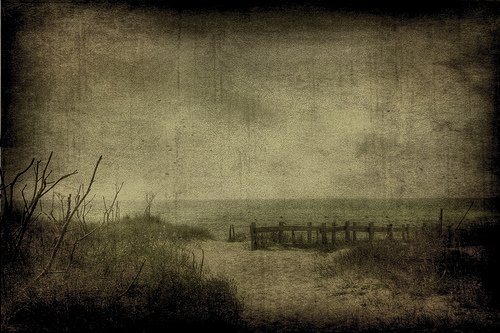Black Sand and Hiraeth
by Israel Centeno and translated by Kelly Harrison / November 21, 2013 / 1 Comment
On words and missing what might have never existed.

Photo: Cinzia A. Rizzo via Flickr.
Every word has a history and an origin; etymology is the study of this. Nevertheless, a word acquires its power through private emotions before it becomes generalized in the considerable subjectivity of stories and legends.

- From his lonely watch post Albert Camus asked who among us has not experienced exile yet still managed to preserve a spark of fire in their soul. “We’re all alone,” Natalia Sedova cried in exile on hearing of her husband Leon Trotsky’s affair with Frida Kahlo. In his novel Night Watch, Stephen Koch follows the incestuous love affair of David and Harriet, wealthy siblings watching the world from their solitary exile. Koch’s writing, Camus’s theories, and Trotsky’s affair all come back to exile and lead me to reflect on the human condition. From my own vantage point, my Night Watch, I will reflect on my questions of exile, writing, and the human condition.

- Israel Centeno was born in 1958 in Caracas, Venezuela, and currently lives in Pittsburgh as a Writer-in-Residence with City of Asylum/Pittsburgh. He writes both novels and short stories, and also works as an editor and professor of literature. He has published nine books in Venezuela and three in Spain.
A couple of days ago, a friend on Twitter sent me a message with a link. The message said, “Look at this beautiful word: Hiraeth. It doesn’t have a direct translation in Spanish.”
According to the dictionary, hiraeth means nostalgia for a place to which you cannot return—or to which there is no way back. I was impressed by this proposed definition, but was able to find a similar word in Galician, a language close to Spanish: Morriña. However, hiraeth‘s uniqueness did not die with this discovery; rather, the complete opposite occurred: By moving away from the first proposal, the word’s definition became richer. Hiraeth: Nostalgia for a place that never was, for an indeterminate place in your past to which you will never return. This definition is very similar to the term saudade, but implies an even more irrational longing for a time, place, or person that never was.
Dictionaries gave me different definitions, and it was only by reading an article by Pamela Petro in the Paris Review that I was able to look beyond their considerations. According to Petro, the word is Welsh and was born from a historical event: The colonization of the country by the English, who named it Wales, or “Place of the Others.” Later on, the word was granted an unmistakable uniqueness through its connection with King Arthur. Legend has it that King Arthur never died; he is merely sleeping until fate calls him back to reign over Wales. Consequently, for Petro, the word hiraeth is a protest, as the father, home, or land is not in the place that it should be.
Hiraeth is the unattainable yearning felt for a person, figure, or even nation that probably never existed.
Having read Petro’s article, I found clarity of thought by comparing my findings with the novel Black Sand (Arena negra), Venezuelan author Juan Carlos Méndez Guedéz’s most recent work. My research into the meaning of hiraeth led to a deeper understanding of Méndez’s story, which, using the letters of the alphabet as chapter titles, outlines the desire for that which is no longer, or has never been. The chapter letters, repeated over and over, create labyrinths in which the reader is faced with the feeling of loyalty that binds the characters together as their searches mirror one another. As it is stated in the text: “Every letter is an inventory of absences.” The characters in the novel, who are as numerous and unique as linguistic signs, seek answers with a desire fueled by the pathos of separation from Venezuela, their mothers, Tenerife, or their fathers. They search, but they will always encounter a black hole that is impossible to fill with words.
Black Sand deals with and describes a sentiment that goes beyond exile: It is a witches’ spell, an intense desire, a profound feeling for that which we never had. From this perspective, thinking about the country that doesn’t belong to us is poignant—a loss, an absence heavy with painful presences and emotions incapable of empathy. A legend, something sleeping that will awaken and regain its strength. Or not.





One Comment on "Black Sand and Hiraeth"
Chora con gran soèdade
Este mens olhos cativo
— Cantigas de Santa Maria, XIIIth century
“My eyes are imprisoned/ Weeping with great longing”. Soèdade (saudade) — “longing” or “yearning” — is a Portuguese word that does not have a precise translation in English.
It has been described as a “…vague and constant desire for something that does not and probably cannot exist…”
Muy bueno tu articulo, Israel. Espero leer Arena Negra pronto. Un abrazo! Wilfredo